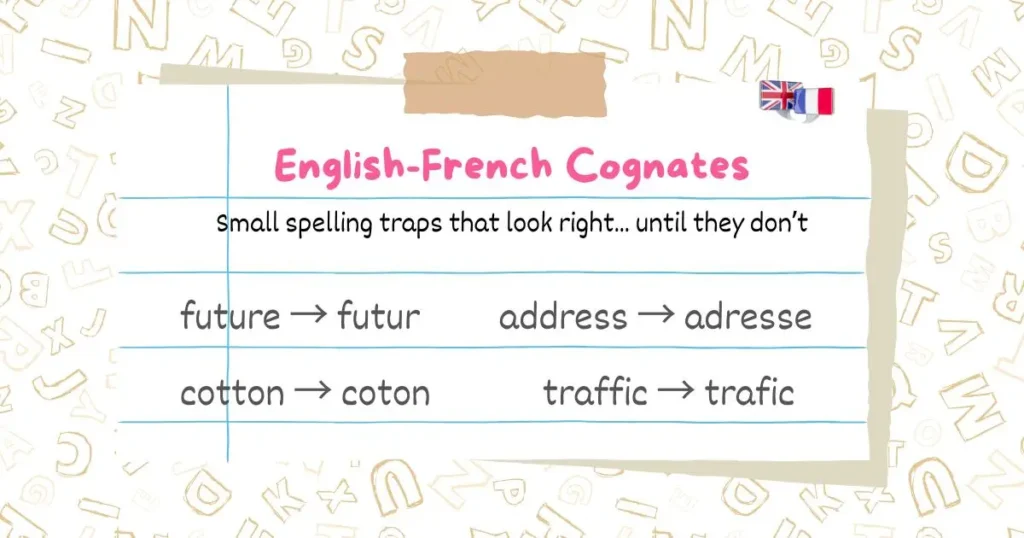If you speak both French and English, you’ve met them: those comfortingly familiar words that share meaning and almost the exact spelling… until a tiny difference trips you up. These are cognates—useful bridges between languages (though interestingly, there’s no direct equivalent word in French). In everyday French, we usually say mots apparentés (linguists also call them cognats). They help a lot, but they can also be quiet spelling traps.
What are cognates?
Cognates are words in different languages with a common origin and the same meaning (e.g., address / adresse). English and French share thousands of words thanks to Latin and Norman influence. The win: faster reading, easier vocabulary. The risk: near-miss spellings that look right at a glance. In any case, cognates are not to be confused with false friends: those look similar but don’t share the same meaning (library ≠ librairie). This post is about real cognates whose spelling diverges just enough to cause mistakes.
The most common spelling traps (with quick examples)
1) English doubles vs French singles
English often doubles a consonant where French keeps one.
-
address → adresse (drop one d)
-
traffic → trafic (drop one f)
2) Final silent letters that vanish in French
-
future → futur (no final e)
-
cotton → coton (single t)
3) Vowel shifts inside the word
-
pronunciation → prononciation (u → o)
-
correspondence → correspondance (e → a)
4) Accents appear in French
Meaning is the same; spelling adds an accent in French.
-
responsibility → responsabilité
-
hospital → hôpital
-
success → succès / progress → progrès
-
system → système / temperature → température / telephone → téléphone
5) UK/US quirks that blur the picture
Sometimes English itself disagrees, which hides the trap:
-
program (US) / programme (UK+FR) → French matches UK here.
-
center (US) / centre (UK+FR) → French spells centre.
Why this matters
Tiny differences aren’t academic nit-picking: in proposals, CVs, and emails, they signal care (or sloppiness). A single missing accent or extra consonant can pull readers out of your message.
Practical ways to stop slipping on cognates
-
Make a personal “repeat offenders” list. Start with 5–10 you miss (e.g., adresse, prononciation, responsabilité, hôpital, système).
-
Turn on both dictionaries. In your browser or editor, enable English + French spellcheck. You’ll catch most slips instantly.
-
Proof once in “accent mode.” Do a final pass just for accents and doubled letters.
-
Read more in both languages. Your eye will start to feel what “looks right.”
-
When in doubt, check—even words you “know”. Cognates are sneaky because they look right. Use reliable resources like Larousse for French spelling verification
Bottom line
All things considered, cognates are both friend and foe in French-English communication. They accelerate comprehension but can sabotage accuracy. The key is treating them with healthy suspicion by appreciating their similarities while respecting their differences.
Remember: in any language, “almost right” is still wrong. These seemingly minor spelling variations can make the difference between polished communication and embarrassing mistakes.
Curious how French shaped English? Read The French influence on English vocabulary.

